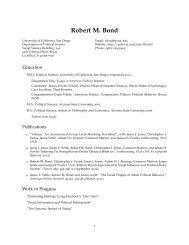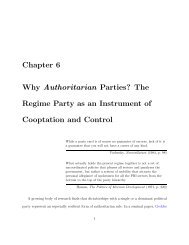Popkin-Reasoning Voter-Ch 3.pdf
Popkin-Reasoning Voter-Ch 3.pdf
Popkin-Reasoning Voter-Ch 3.pdf
You also want an ePaper? Increase the reach of your titles
YUMPU automatically turns print PDFs into web optimized ePapers that Google loves.
52<br />
<strong>Ch</strong>apter Three<br />
When one party convinces voters that its position is demonstrably better<br />
on some issue, the other party either adapts or fails to gain votes in the<br />
future.<br />
Ideology is thus a mark not of sophistication and education, but of uncertainty<br />
and lack of ability to connect policies with benefits. The word<br />
ideology is a loaded one in America, evoking the derogatory sense of<br />
ideologues-people who have belief systems to which they adhere steadfastly.<br />
(As Clifford Geertz has noted, "I have a social philosophy; you have<br />
public opinions; he has an ideology."l27 Downs, however, was equating<br />
ideology not with intellectual sophistication or moral rigidity, but with<br />
simple shortcuts and loosely integrated views about what parties stand for<br />
in the minds of voters. A party's ideology and past performance matter only<br />
when the voter cannot with certainty predict its future behavior from its<br />
platform. Parties try hard to remind voters about their views of the good<br />
e im-<br />
,ouc f both<br />
@nandpartyideologies:whena<strong>Voter</strong>hasnoinformation<br />
about current performance, or is uncertain of what the effects of a proposal<br />
are, he or she reverts to default values.<br />
But unavailability of data is not the only reason voters revert to default<br />
values. They do this when they are so satisfied with their past choices that<br />
they see no reason to collect any data. So long as the candidates' actions<br />
appear consistent with the generalized notion the voter attaches to a particular<br />
label, the voter can avoid the effort of keeping track of all the various<br />
activities of government. As Downs put it, sometin\es voters have no data<br />
because they do not expect a fair retum on their investment of effort:<br />
society an<br />
Finally, some rational menhabituallyvote forthe same party<br />
in every election. In several preceding elections, they carefully<br />
informed themselves about all the competing parties,<br />
and all the issues of the momenq yet they always came to the<br />
same decision about how to vote. Therefore they have resolved<br />
to repeat this decision without becoming wellinformed,<br />
unless some catastrophe makes them realize it no<br />
longer expresses their best interests. [This habit] keeps voters<br />
from investing in information which would not alter their<br />
behavior.2s<br />
Since voters have limited information and diflerent priorities, parties<br />
that seek their votes a.e bound to be coalit,pns that coordinate vote$rts<br />
to pursue a set of collective goods. Although the coalition may exhibit stability<br />
over time, the basis of each individual's attachment to it is utilitarian:<br />
,*ififte;o<br />
Gotng without Data<br />
ll rlepends on the rewards received. Thus even when there is widespread<br />
rrflrccment within a party on general goals, there is no reason to assume<br />
that all voters have the same priorities, or that they pay attention to the<br />
tdtne issues. This view of political parties as coalitions has two important<br />
I t r r pl ications for understanding voting decisions.<br />
lrirst, as noted earlier, the -rltr<br />
Hrggests that one should i6GE consensus of ittitudes across issues<br />
ryf hin the p a<br />
hlack Democrat who is both pro-civil rights and anti-labor, or even any<br />
logical reason to suppose that he or she experiences any significant crossllressure<br />
when casting a vote for a Democrat. Rrrthermore, seeing the parlles<br />
as coalitions makes it illogical to assume that any significant number of<br />
volcrs should be able to locate the party on some hypothetical "continllun"<br />
that summarizes party positions for all issues. Given the cost of<br />
gnllrcring information solely for the purpose of making a vote decision, we<br />
tltould not expect a consensus on issues within parties. Where candidates<br />
ru'('cngaged in assembling a coalition of voters interested in only one issue,<br />
ut' rlnly a few issues, people in every coalition are ignorant of the candirlrtlc's<br />
stand in many areas that are not central to their primary concems.<br />
'l'lrc implication for voting research is clear: unless voters are sorted accordlltg<br />
to the importance they attach to specific issues, one cannot expect to<br />
llrrtl high levels of interest or of information.<br />
Sccond, within every coalition there are people who disagree with the<br />
cartdidate or the pany position in some area but still support the candidate<br />
rrt' lrarty. In 1964, for example, it was not essential for a black Democratic<br />
volcr whose primary concern was civil rights to be familiar with Lyndon<br />
,hrlttrson's Vietnam policy in order to be an issue-oriented voter. Nor would<br />
ll bc surprising today to find that advocates or opponents of right-to-life<br />
lcgislation are totally ignorant about farm price-support policy or deficittcrluction<br />
proposals. However, when there are political primaries, there<br />
are fights for control of a pafiy between its various intemal factions.<br />
<strong>Ch</strong>anges in Party Idenffication<br />
ll<br />
1rarty idertificati al<br />
tt!<br />
ies, then there should be feedback from a<br />
votcris Cvaluations of current policieffi. on the other<br />
It,rnd, if the only events that affect party identification are catastrophes on<br />
the order of the Great Depression, party identification is only a running<br />
t.rlly of publlc reaction to cataclysms, and party voting is voting that is un-<br />
,rll'ected by the year-to-year turns of politics. When the authors of The<br />
,7<br />
ttt











